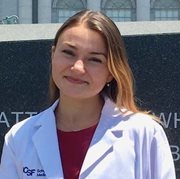Isabella Auchus

Isabella is a fourth-year medical student at the University of California, San Francisco School of Medicine. She is currently on a research fellowship year between her third and fourth years and launching her own sub-study in collaboration with the Fijian Ministry of Health to investigate the epidemiology of the country’s sexually transmitted infections. Isabella spent her childhood and early adulthood moving across cities, states and countries every few years. These multiple transitions exposed her to a diversity of people and cultures, kindling her interest in global and public health. She is passionate about understanding health challenges in under-resourced areas, and her goals include utilizing research to shape public health interventions and improve population health.

Identifying Prevalence and Reinfection Rates of Sexually Transmitted Chlamydia Trachomatis Infections Among Women and Their Partners Seen at Diverse Health Clinics in Fiji
Fiji Center for Communicable Disease Control
Fiji
What does the Kean Fellowship mean to you?
This fellowship provides me with a unique opportunity to explore and learn about tropical medicine through clinical and epidemiological research. I look forward to gaining experience in this field with the support and encouragement of my mentor and the ASTMH and Kean fellowship community.
What do you anticipate learning?
Throughout my year of global health research, I anticipate learning further about the intersections of culture, health and opportunities to improve patient health outcomes on a larger scale. I hope to gain a fuller understanding of the challenges that must be overcome in order to conduct global health research and appropriate clinical care. I plan to grow skills that will help me pursue global and public health work throughout my career. These include communicating with the Ministry of Health, working with local hospital staff, handling large datasets, and data analysis. I am eager to see my own sub-project through from beginning to end, and to experience the challenges of partnering across cultures and countries to improve public health and reduce disparities in healthcare.
What interests you about tropical medicine and what problems are you interested in solving?Throughout my life, I have been exposed to the vast diversity and cultures that exist around the world, which has led me to recognize the significant impact that public health has on people’s lives. This, along with an interest in the social and natural sciences, led me to explore my interests in global public health through my coursework, research and immersive experiences. During my first year of medical school, these interests led me down the path to discovering tropical medicine – I became involved in a UCSF research team working alongside local partners in under-resourced areas of Fiji. I spent two months working in Viti Levu, Fiji, where I enrolled women at local health clinics to undergo STI testing in order to assess the burden of Chlamydial (Ct) and Gonorrheal (Gc) infections in Fiji. I immersed myself in the culture and experienced firsthand how research can be utilized to alleviate the burden of disease, especially communicable diseases, in tropical areas.
I am passionate about understanding health challenges in low-resource areas and am excited by the opportunity to engage in robust yearlong research to address disparities for people living in Fiji. By participating in this year of research, I hope to make impactful change in the reproductive health of individuals in underserved Fijian communities, as further research is needed to better understand and quantify the incidence and risk factors for Ct re-infection. By addressing this gap in knowledge, preventive services and treatment can be further implemented to decrease reinfection rates and improve partner testing and treatment. Understanding the extent and influence of partner infections on Ct rates has potential to improve targeted public health interventions and control this epidemic before it further compromises the health and fertility of Fiji’s young population.